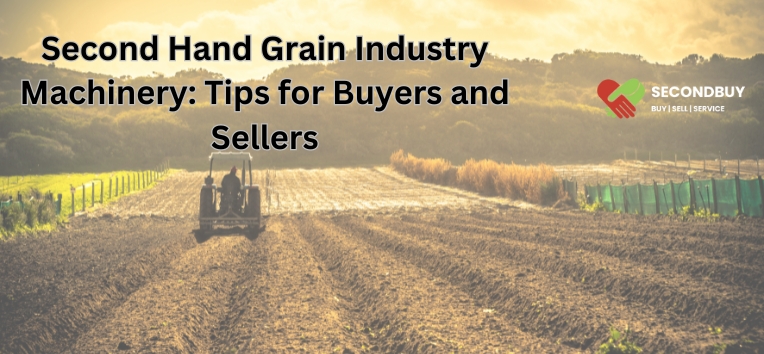Second Hand Grain Industry Machinery: Tips for Buyers and Sellers
In the grain industry, investing in old grain industry machinery is crucial for efficient grain processing and production. However, purchasing brand new machinery can be costly, especially for small-scale businesses. Thankfully, the market for second-hand grain industry machinery provides a viable solution. Whether you're a buyer or a seller, this will provide valuable tips for navigating the world of old grain industry machinery. From understanding the benefits to ensuring a smooth transaction, we'll cover everything you need to know.
Benefits of Second Hand Grain Industry Machinery:
Cost Savings: One of the primary advantages of buying second-hand machinery is the significant cost savings. Compared to purchasing new equipment, used machinery is often available at a fraction of the price, making it an attractive option for businesses on a budget.
Immediate Availability: When buying second hand grain industry machinery, you can avoid lengthy lead times associated with ordering new equipment. Used machinery is readily available, allowing you to quickly integrate it into your operations and minimize downtime.
Established Performance: Old grain industry machinery often has a track record of performance and reliability. By researching the reputation and maintenance history of the equipment, you can gain insights into its performance capabilities and assess whether it meets your specific requirements.
Tips for Buyers:
Assess Your Needs: Before purchasing second hand grain industry machinery, assess your specific needs. Consider factors such as the type of grain processing you require, production capacity, and any specific features or functionalities you need. This will help you narrow down your options and ensure that the buy grain processing machines align with your operational requirements.
Research and Inspect: Thoroughly research the sellers and their offerings. Look for reputable sellers or dealers who specialize in second hand grain industry machinery. Ask for detailed information, including the machinery's age, maintenance history, and any modifications or refurbishments done. If possible, arrange an inspection to assess the condition of the equipment firsthand.
Verify Documentation: Request and review all relevant documentation, such as user manuals, maintenance records, and any warranties or certifications associated with the buy grain processing machines. This documentation provides valuable insights into the equipment's history and helps you make an informed decision.
Test Run and Warranty: Whenever possible, request a test run of the machinery to ensure its functionality and performance. Additionally, inquire about any warranties or guarantees offered by the seller. A warranty can provide you with peace of mind and protection against unforeseen issues.
Tips for Sellers:
Clean and Maintain Machinery: Before listing your second hand grain industry machinery for sale, ensure it is thoroughly cleaned and well-maintained. Conduct any necessary repairs or servicing to optimize its condition and performance. A well-maintained machine is more likely to attract potential buyers and fetch a higher price.
Gather Documentation: Compile all relevant documentation, including user manuals, maintenance records, and any warranties or certifications associated with the machinery. Having comprehensive documentation enhances the credibility of your offering and instills confidence in potential buyers.
Provide Detailed Descriptions: Create accurate and detailed descriptions of the machinery you are selling. Include specifications, production capacity, any additional features or accessories, and its overall condition. High-quality photographs can also help showcase the equipment and attract potential buyers.
Transparent Communication: Practice open and transparent communication with potential buyers. Be responsive to inquiries and provide prompt and honest answers. Clear communication builds trust and increases the likelihood of a successful transaction.
Conclusion
The second-hand grain industry machinery market offers a cost-effective solution for businesses looking to invest in grain processing equipment. For buyers, careful assessment of needs, thorough research, and inspections are essential to ensure a successful purchase. Sellers, on the other hand, should focus on presenting well-maintained machinery, providing detailed information, and maintaining transparent communication. By following these tips, both buyers and sellers can navigate the world of second-hand grain industry machinery with confidence, making transactions that benefit their operations and contribute to the growth of the grain industry as a whole.

